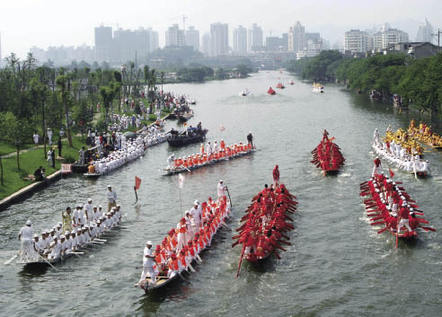| Wenzhou's Environmental Growing Pains
IN Wenzhou, waxberries are about to ripen in May on the hill of Jiedai Village, Lecheng Town, Yueqing City. An old man named Huang, owner of the hilly orchard, is full of excitement about the coming harvest. Several years ago, no one dared to eat waxberries from these trees, since they were adjacent to an electroplating factory.
 |
| A dragonboat race on the river. |
The Price of Development
Chengnan Electroplating Factory was established more than a decade ago on a slope north of Jiedai Village. Initially, the villagers did not notice any changes. But then the color of the river darkened and some trees withered. The villagers began to suspect the factory was the culprit, whose discharge into the river was later found to contain cyanide, chrome, copper, zinc and lead.
In 2008, the production value of Wenzhou's electroplating sector reached RMB 5 billion. With the rise of this industry, Wenzhou's products have won a greater market share, which has brought about the rapid development of the leather and other light industries. Unfortunately, rapid development and poor pollution control also means the town has become mired in regional contamination.
There used to be more than 600 similar electroplating enterprises in Wenzhou City, most small in size and backward in technology. The pollution treatment equipment was shabby, and most of the wastewater was discharged directly into rivers. As a result, the river network of the plain was all polluted to some degree. "We took the path of 'polluting first and tackling the fallout later'," said Xu Yue, a professor at the Zhejiang University of Finance and Economics. In addition to the electroplating operations, many other polluting enterprises were concentrated in Wenzhou, such as textiles, papermaking and leather processing. Environmental pollution became serious.
In 2005, Zhejiang Province selected eight river systems to establish pollution control and set up 11 key monitoring points. Wenzhou's electroplating industry was designated one of these 11 key monitoring points. Illegal electroplating enterprises were closed down, and legal enterprises were upgraded with more effective technology, so the treatment of wastewater, waste gas and residue could be standardized.
Hopeful Land
On the homepage of the city's Environmental Protection Bureau, the banner consists of four Chinese characters meaning "Green Wenzhou." This represents the desire and determination of Wenzhou people to improve their environment.
"This is a lesson for Wenzhou," said Hong Zhenning, vice-chairman of the Wenzhou Municipal Federation of Social Sciences Circles. He points out that most of Wenzhou's industrial groups are labor- and capital-intensive and based on obvious low-cost advantages. While these industrial groups promote rapid economic growth, they have also brought about over-consumption of resources and serious environmental pollution.
In his opinion, the main obstacles hindering pollution control of these industrial groups are high treatment costs and incompetent environmental supervision. The present policy in China is to hold those who cause the pollution responsible for the cleanup. While this is feasible for large enterprises, it is difficult to enforce this policy with most medium-sized and small enterprises, since they do not have adequate financial strength to raise funds for pollution control facilities. Very often the fine they pay for environmental pollution is smaller than the losses caused by the suspension of production and the costs of purchasing and maintaining pollution treatment equipment. If they operate according to waste discharge standards, there will be no profits. As a result, some enterprises just act perfunctorily. When there is an inspection, they just go through the motions, or, if caught, pay the fine. This has seriously retarded pollution control.
Meanwhile, China's laws and regulations on environmental management need to be refined. In general the penalties for violation of environmental protection laws are excessively lenient. The cost of law violation is low and the cost of law-abiding is high. This actually encourages polluting practices.
| 